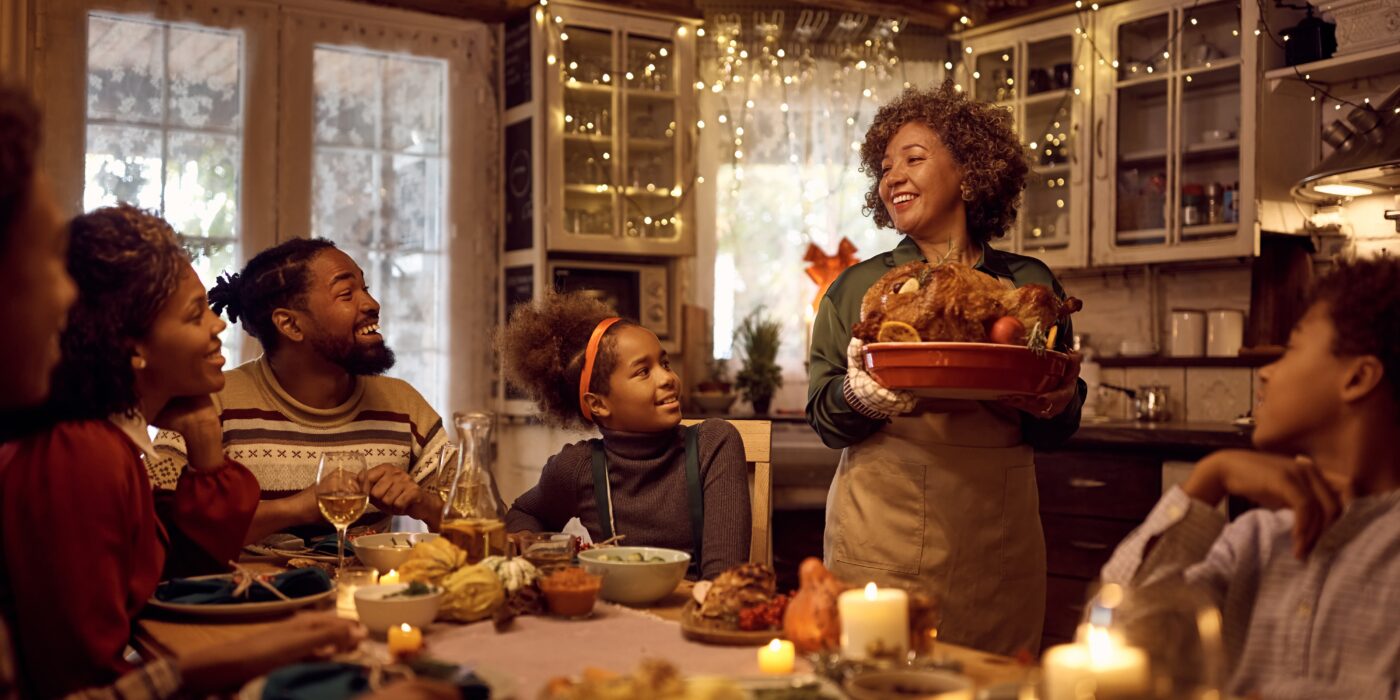As you gather with friends and family this holiday season, you may be inclined to abide by the old maxim: Never discuss politics or religion at the dinner table. Afterall, it’s all too easy for celebratory occasions to be ruined and relationships broken when political discussions dissolve into brawls.
But considering the 2024 elections, the war between Israel and Hamas, union strikes, former President Donald Trump’s trials and more, there will be plenty of opportunities for politics to creep into holiday gatherings this year.
Rather than avoid talking about these hot-button issues, Taylor Carlson, an associate professor of political science in Arts & Sciences at Washington University in St. Louis, said we would be better off learning to have open, respectful conversations with one another — especially with those who have opposing viewpoints.

“Recent research has shown that conversations between out-partisans — Republicans talking to Democrats — can reduce polarization, both in terms of reducing the hostility toward the other side and in terms of reducing ideological polarization,” said Carlson, co-author of the book “What Goes Without Saying: Navigating Political Discussion in America.” “The key challenge here is that most people find these types of conversations uncomfortable and prefer to discuss politics with others who agree with them, if at all.”
Political conversations always have been on the table for Carlson and her family. In fact, she said many of these discussions have inspired her research.
“Although my family has been known to literally throw rolls of bread at each other across the dinner table, none of these bread fights have been because of politics,” she said. “For the most part, we agree with each other — sometimes so much that we find new ways to push buttons to make the conversation a little more interesting.”
Below, Carlson explains more about why it’s so difficult to talk about politics, how social media contributes to the problem and offers tips for navigating these discussions with friends and family.
Why is it so difficult for people to have conversations around politics?
In our book, Jaime Settle and I introduce a framework for thinking about these types of questions as being driven by three goals central to human behavior: affiliation (having social relationships with others); affirmation (maintaining a positive self-concept); and accuracy (being right). Thinking about these goals and broader scholarship on polarization in the U.S. can help us unpack why people find it so difficult to talk about politics and how they navigate those conversations as they detect disagreement, decide to engage, discuss and determine what comes next.
Today, there is an increasing overlap between our political identities and other social identities. When these identities blend together, conversations that could threaten that can lead people to become defensive as they try to preserve their group identity. Likewise, when driven by affirmation goals, we want to engage in behaviors that preserve our social identities and keep us feeling good about ourselves.
At the same time, we are seeing a rise in affective polarization — hostility toward the other side — and increased stereotypes about partisan groups. These stereotypes are hard to get out of our heads, and if we are thinking about a caricatured version of the outgroup, we might feel even colder toward them and be less willing to engage in conversation.
When we are motivated to affiliate with others, these tensions become really hard to reconcile. We don’t want to risk an uncomfortable discussion ruining our social relationships. So, instead of agreeing to disagree, many people find it easier to simply avoid discussing politics altogether for the sake of their relationships.
In our research, we found that when people perceived that others were motivated by affiliation goals, they were more likely to be concerned about the negative outcomes of the discussion than excited about its opportunities. These concerns are very real. It doesn’t take long to reflect upon personal experiences or read news headlines that highlight the ways in which social relationships have been damaged because of politics. We also found that about a quarter of Americans report that they have distanced themselves from a friend because of politics.
While the social ramifications of political discussion seem to drive much of the behavior, accuracy also plays an important role. People don’t like to be wrong! As a result, some people will opt out of political discussion for fear of not knowing enough to hold their own in the conversation. I suspect that accuracy goals are increasingly at the center of people’s decisions to engage in discussion because of rising polarization between Democrats and Republicans over facts, but more research would be needed to fully test this.
How has social media exacerbated the problem?
Facebook, in particular, has been shown to create the perfect storm for affective, psychological polarization to flourish because it creates a space for identity recognition and reinforcement, biased information processing, and out-group stereotyping. People make assumptions about others’ political views based on seemingly nonpolitical content they post.
One concern about social media is that it exposes people to more like-minded content, or at least limits their exposure to content they might disagree with. However, recent evidence from a mega collaboration between academic researchers and scientists at Meta revealed limited evidence of reduced exposure to like-minded content affecting political attitudes or polarization. Another concern is that because stronger partisans are the ones more likely to generate content on social media, people who are less interested in politics and only inadvertently exposed to politics on social media are presented with more extreme versions of the other side, rather than the more moderate majority.
That’s not to say that social media is all bad. It can be a convenient place to get political news, and it is a powerful tool to increase political knowledge and engagement. But it is important to be aware of the bias in the news — and even in the comments — to which we’re exposed online and to put in some extra effort to reach beyond our echo chambers and seek out additional information from other perspectives.
You’ve already said that engaging in conversation with out-partisans can reduce polarization. What are some other pros and cons of political conversation?
Some have suggested that conversations between like-minded people could increase polarization, but the evidence is relatively mixed. Some of my work suggests that people can learn just as much as they could from reading a news article if they get information socially from a more knowledgeable co-partisan. Yet, in my forthcoming book, “Through the Grapevine: Socially Transmitted Information and Distorted Democracy,” I show that when people pass information they read in the news on to their peers, they are likely to change that information in a way that makes it sparse, biased, less accurate and mobilizing, compared to the news on which it was based. These changes can be subtle, but they can pack a punch when it comes to influencing the attitudes of the people who receive that information.
As a result, I found that when people receive information from co-partisans, they are also more likely to believe misinformation, have more polarized policy preferences and report that they are more likely to engage in politics, compared to receiving no information at all.
People have a lot of tradeoffs to consider. In a cross-partisan discussion, polarization could be reduced, but they are likely to feel uncomfortable, and their relationships could be in jeopardy. In an intraparty discussion, people could learn, be more engaged and be more comfortable, but they could also be more likely to believe misinformation and have more extreme preferences.
Rather than avoid these discussions altogether, I think the advice is to be aware of the possibility of information distortion in political conversations. Taking a step back to critically evaluate the information our peers share with us in a way that is similar to how we should evaluate information we read in the news could go a long way toward mitigating some of the negative consequences of political discussion and allow the benefits to shine through.


